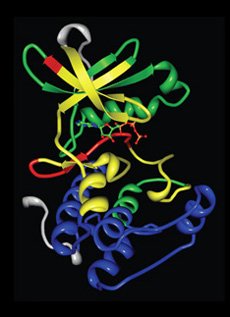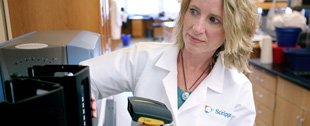Home » Translational Research » Research Highlights » Cancer » Here
In this section
Cancer: distinguishing "driver"
from "passenger" genetic mutations
Each cancer is characterized by numerous somatic mutations, of which only a subset contributes to the tumor’s progression. Scientists want to be able to distinguish these “driver” mutations from the preponderance of neutral “passenger” mutations that characterize each cancer, so that they can take advantage of the wealth of data produced by the large-scale tumor resequencing studies to advance understanding and treatment of cancer.
Scripps Translational Science Institutes (STSI) researchers developed a support vector machine (SVM)-based method that differentiates common, likely nonfunctional genetic variations from Mendelian disease-causing polymorphisms, specifically within the genes encoding the kinases, the protein family most frequently associated with cancer development and progression.
The researchers subsequently demonstrated that this specialized method of making highly precise predictions within the protein kinase gene family also accurrately and quickly identified known “driver” mutations in tumors. The scientists showed that their method generated data that aligned with previous statistical estimates of the frequency of “drivers,” and provided strong evidence that predicted “drivers” are under positive selection.
In multiple cancer data sets, the method identified particular positions in protein kinases that seemed to play a role in oncogenesis. It also enabled the researchers to compile a ranked list of candidate “driver” mutations. These “driver” mutations seemed to be very involved in nucleotide binding, possibly driven by resistance to inhibitors mimicking ATP, and regulatory functions, especially movements from the inactive to active conformation.
Accurate predictions of “drivers” in other protein families, such as transcription factors or phosphatases, build upon the data on kinases to help scientists draw a more ‘‘holistic’ picture of tumorigenesis and cancer treatment.
 In this image, which illustrated a 2008 cover of the journal Cancer Research, the structural distribution of predicted cancer “driver” mutations is depicted as a heat map overlaid on the crystal structure of M120 (PKA), which is frequently mutated in drug resistant cancer cells. Red indicates the highest density of “driver” mutations followed by yellow, green, and blue. Identifying cancer “drivers” is a crucial first step toward individualizing a cancer patient’s treatment according to the tumor’s genetic signature.
In this image, which illustrated a 2008 cover of the journal Cancer Research, the structural distribution of predicted cancer “driver” mutations is depicted as a heat map overlaid on the crystal structure of M120 (PKA), which is frequently mutated in drug resistant cancer cells. Red indicates the highest density of “driver” mutations followed by yellow, green, and blue. Identifying cancer “drivers” is a crucial first step toward individualizing a cancer patient’s treatment according to the tumor’s genetic signature.
The scientists completed the study and published the results in a 2008 Cancer Research paper titled, “Prediction of Cancer Driver Mutations in Protein Kinases.” Authors were Ali Torkamani, Ph.D., and Nicholas J. Schork, Ph.D.
